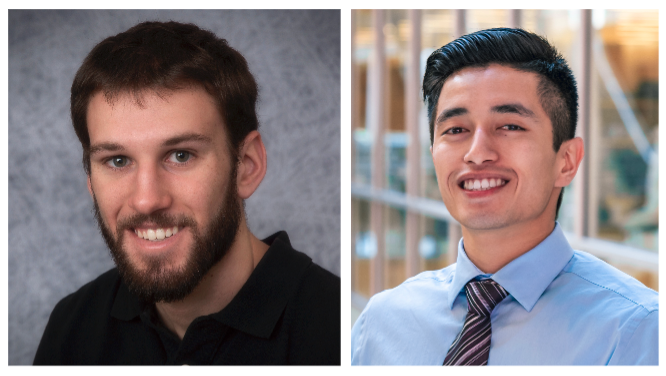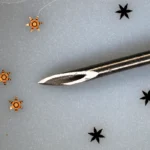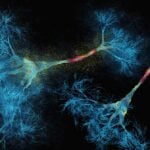Two INBT Students Awarded NSF GRFP Recognition

Photo: Derek VanDyke (left) and Alexander Hasnain (right)
The National Science Foundation (NSF) Graduate Research Fellowship Program (GRFP) recognizes and supports STEM graduate students that show outstanding performance in their field. It is one of the oldest fellowships established by the NSF and is an extremely competitive award with well over 10,000 applications received every year. The GRFP supports graduate research training and provides recipients three years of financial support, which includes a $34,000 annual stipend and a $12,000 education allowance.
Two INBT students have been awarded recognized by the NSF GRFP. Derek VanDyke is the recipient of the award and Alexander Hasnain received honorable mention.
Derek VanDyke
Derek VanDyke’s research focuses on combining cutting-edge technologies from structural biophysics, molecular engineering, and translational immunology to engineer proteins that can be used as targeted therapeutics.
He is a second year PhD candidate in the Department of Chemical and Biomolecular Engineering working in the Translational Tissue Engineering Center under the guidance of Jamie Spangler, an INBT affiliate faculty member. He received his bachelor’s of science in chemical engineering from the University of Massachusetts Lowell, and is also a Johns Hopkins-AstraZeneca Scholar, which is a program that allows for graduate students to obtain hands-on experience in the biopharmaceuticals industry.
“After graduate school, I hope to continue a research career in the biotechnology field. I am deeply honored to receive this prestigious award, and I am grateful to all my research mentors, family, and friends that have supported me along the way,” said VanDyke
Alexander Hasnain
Alexander Hasnain’s research focuses on developing sample-to-answer, point-of-care platforms for detecting infectious diseases and cancer by miniaturizing and automating nucleic acid amplification testing and related assays. His current projects are aimed at the diagnoses of esophageal cancer, COVID-19, and HIV. His goal is to innovate point-of-care diagnostics and contribute to scientific growth to make precise medical care more accessible.
He is a PhD candidate in the Department of Biomedical Engineering under the mentorship of Jeff Wang, INBT core faculty member.
“I am very grateful to receive this honor from the NSF in recognition of my work. I would especially like to thank my doctoral advisor Jeff Wang, and my previous advisors, Rashid Bashir at the University of Illinois at Urbana-Champaign, Junghoon Lee at Johns Hopkins University, and Maryam Rettmann at the Mayo Clinic, whose guidance has been pivotal. I am also thankful for my mentor, Alexander Trick, and my family for their strong support,” said Hasnain.
Latest Posts
-
 Johns Hopkins Postdoc Named in Forbes `30 Under 30′ List
December 8, 2025
Johns Hopkins Postdoc Named in Forbes `30 Under 30′ List
December 8, 2025
-
 Micro Grippers: David Gracias Builds Micromachines That Fold, Stick, Swim, and Sense—All Inside the Human Body.
November 20, 2025
Micro Grippers: David Gracias Builds Micromachines That Fold, Stick, Swim, and Sense—All Inside the Human Body.
November 20, 2025
-
 A bold new approach to autoimmune diseases
November 19, 2025
A bold new approach to autoimmune diseases
November 19, 2025


